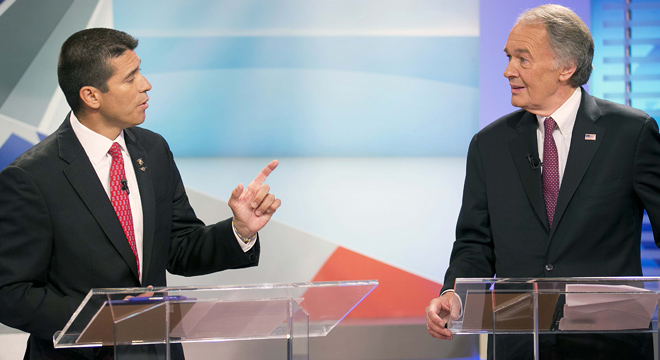Though both of the candidates in Tuesday’s Massachusetts Senate special election have criticized each other for taking money from outside groups, they have both been supported by millions of dollars from PACs and other outside groups. Based on data from Federal Election Commission filings and reported PAC activity, about 38 percent of the more than $12 million spent by Rep. Ed Markey (D-MA) and Republican businessman Gabriel Gomez in this race has come from outside groups.
Markey started the race for the seat vacated when John Kerry was named secretary of state with an approximately $3 million advantage from his House of Representatives campaign war chest. From January 1 until June 5, Markey has raised approximately $7.67 million for his Senate bid. Of that total, about eleven percent came from political action committees rather than individual donors, including $45,400 from the Democratic Senatorial Campaign Committee. Additionally, Markey has raised at least about $117,000 from political action committees since June 5.
Along with the direct donations from political action committees, Markey has reportedly benefitted indirectly from at least approximately $1,500,000 spent on the race by the League of Conservation Voters, the Democratic Senatorial Campaign Committee and the NextGen Committee, a super PAC formed by billionaire investor Tom Steyer that spent over $300,000 to bolster Markey in the Democratic primary. In total, PACs and super PACs have spent at least about $3.1 million to boost Markey’s campaign so far.
Markey’s initial fundraising advantage was also owed partly to outside spending. According to the Center for Responsive Politics, between 1989 and 2012, Markey took approximately $2.8 million of the $12 million he raised for his House campaign account from PACs.
From January 1 until June 5, Gomez has raised approximately $2.3 million for his Senate campaign. About seven percent of that amount, $170,000, came from political action committees rather than individual donors, including $45,400 from the National Republican Senatorial Campaign Committee. Gomez has also raised at least about $35,000 from political action committees since June 5.
In addition to the direct donations from political action committees, Gomez has reportedly benefitted indirectly from approximately $868,000 from the NRSC, about $75,000 from the Committee for a Better Massachusetts, a Super PAC started by an attorney named Michael Morales, and $1.1 million spent by Americans for Progressive Action, a super PAC funded by John Jordan, the chief executive of the Jordan Vineyard and Winery in California.”
In total, PACs and super PACs have spent at least about $2.2 million backing Gomez so far.
Earlier in the race, each campaign criticized the other for benefiting from this type of outside spending. Last month, the Markey campaign slammed Gomez for declining to sign the “People’s Pledge,” an agreement to stop third-party groups from buying ads supporting either of the candidates which first appeared in the 2012 Massachusetts race between Senator Elizabeth Warren (D-MA) and former Republican Senator Scott Brown. Gomez’s campaign responded by claiming there was a “cloud of hypocrisy” over Markey’s “People’s Pledge” push in light of the money he took from PAC’s during his more than two decades in the House.
Will Ritter, a spokesman for Gomez, declined to comment on spending by outside groups that benefitted the campaign, but he noted Markey has spent far more on the race.
“Gabriel Gomez has brought his outsider message of reforming Congress across the state, and is thankful for the support he has received to champion common-sense, independent principles,” Ritter said in a statement. “Career Politician Ed Markey and his special interest group allies have outspent Gabriel by millions to keep politics-as-usual humming along in Washington D.C., but this race is still in the single digits. Gabriel is earning the vote, talking to people one on one about creating jobs and reforming Washington DC and we’re confident going into election day.”
Andrew Zucker, a spokesman for the Markey campaign, blamed the presence of money from PACs and super PACs on Gomez’s refusal to sign the “People’s Pledge.” He also pointed out Gomez has defended the Citizens United Supreme Court decision, which paved the way for the rise of super PACs in American elections.
“It was Gabriel Gomez who opened the doors for outside groups to spend money in this election when he repeatedly refused to sign the People’s Pledge and said he supports the Supreme Court’s misguided Citizens United ruling, but that’s not why he will lose on Tuesday,” said Zucker. “Voters want a Senator who will fight for Massachusetts and that’s not Gabriel Gomez, who would bring Mitch McConnell one step closer to controlling the Senate, obstructing President Obama and enacting a radical right-wing agenda that’s bad for Massachusetts families.”






